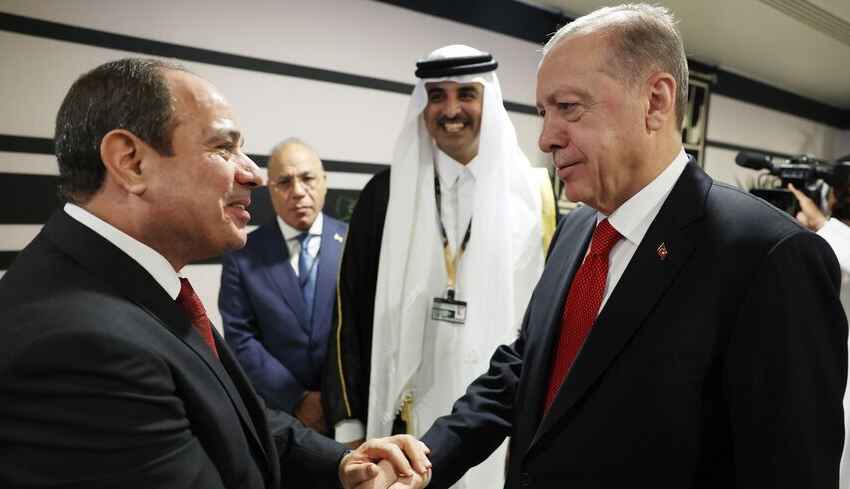
A football event, beyond the general purpose of entertaining the masses, is also a first-class opportunity for informal meetings between diplomats and heads of state. Such an opportunity seemed to be taken advantage of by the Presidents of Egypt and Turkey, Abdel Fattah El-Sisi and Recep Tayyip Erdogan, respectively, to restart diplomatic contacts between their countries towards the normalization of their relations. During an opening ceremony of the World Cup, the two men, hosted by Qatar’s emir, Sheikh Tamim bin Hamad Al Thani, had the opportunity to engage into an enthusiastic handshake, the first one between them.
The gesture was called a new beginning in ties with Turkey by President El-Sisi. In addition, Egypt’s presidential spokesman Bassam Radi mentioned later that both Presidents “confirmed the depth of historical ties between the two countries”. On his side, President Erdogan through a statement referred “that a process can begin”. A possible alliance between Turkey and Egypt, or even the normalization of relations between them, would radically change the power balance in the Eastern Mediterranean, especially for Greece and Cyprus.
However, relations between them are not ideal, following El Sisi’s coup that ousted President Mohamed Morsi and outlawed his Muslim Brotherhood party. As Al Jazeera has mentioned, Turkey has for years served as a refuge for opposition activists from Egypt, further stoking tensions between the two regional powers. Erdogan has also stated in the past that will not meet El-Sisi until “all the prisoners are released with a general amnesty”. Moreover, the two leaders’ differing approaches to the ongoing war in Libya, where they backed rival sides, have so far delayed rapprochement talks.
The Turkish President yet seems willing to leave these differences in the past. Erdogan’s change of attitude is not at all accidental, but it comes at a time when Turkey has several open fronts. The involvement in Libya, Syria and Azerbaijan’s hostilities against Armenia, the relationship he maintains with President Putin and the purchase of the S400 missiles, resulting in the Congress’ blocking of a new F16 pack, are leading Erdogan to seek new allies. In this search, Egypt seems to be an ideal ally.
First let’s not forget that Egypt maintains outstanding relations with Greece and Cyprus, which extend to the energy sector as well as to the arrangement of their maritime borders (Greece and Egypt in August 2020 sign agreement on exclusive economic zone). The two countries are a traditional rival of Turkey in the eastern Mediterranean, both due to the Cyprus occupation as well as due to the demarcation of maritime zones and hydrocarbon mining. On the other hand, Turkey has signed its own agreement in the region with the government of Tripoli in Libya on maritime borders. The deal triggered tensions in the area, with Greece and Egypt among the ones that showed vehement objections.
Therefore, the normalization of their relations with Egypt may have a double impact on the redistribution of power in the Eastern Mediterranean. On one hand, it will strengthen Turkey’s position in the region by acquiring a new ally, which could also lead in new perspectives of the agreement with Libya and provide a more immediate solution to Turkey’s energy problem. On the other hand, it will weaken the position of Greece and consequently of Cyprus in the region, possibly giving Europeans second thoughts regarding the future of the region and the extraction of hydrocarbon reserves.
As far as the government in Cairo is concerned, a resumption of its relations with Turkey may prove especially useful in Egypt’s tensions with Israel. The relations between the two countries are deteriorating and Turkey can play a mediating role since Ankara had already reconciled with Israel. Furthermore, a normalization with Ankara can assist Egypt to boost its damaged economy. Despite their differences, the countries have kept their trade relations and can increase them even more in case of political stabilization between them.
Whatever the outcome of the talks between Egypt and Turkey, countries in the region and their allies must be on alert. In particular, European leaders must be ready to face any outcome. Nevertheless, this “new beginning” does not mean that things will definitely change, after all, Erdogan’s Turkey has a tradition of walking away from negotiations that do not lead to its wishes, such as its accession negotiations with the EU.
By The European Institute for International Law and International Relations.














